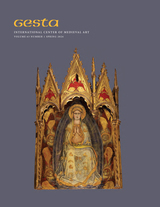120 books about Evolution (Biology) and 7
start with C
120 books about Evolution (Biology) and 7
120 books about Evolution (Biology)
7 start with C start with C
7 start with C start with C
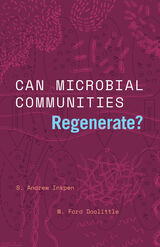
Can Microbial Communities Regenerate?
Uniting Ecology and Evolutionary Biology
Andrew Inkpen and Ford Doolittle
University of Chicago Press, 2022
By investigating a simple question, a philosopher of science and a molecular biologist offer an accessible understanding of microbial communities and a motivating theory for future research in community ecology.
Microorganisms, such as bacteria, are important determinants of health at the individual, ecosystem, and global levels. And yet many aspects of modern life, from the overuse of antibiotics to chemical spills and climate change, can have devastating, lasting impacts on the communities formed by microorganisms. Drawing on the latest scientific research and real-life examples such as attempts to reengineer these communities through microbial transplantation, the construction of synthetic communities of microorganisms, and the use of probiotics, this book explores how and why communities of microorganisms respond to disturbance, and what might lead to failure. It also unpacks related and interwoven philosophical questions: What is an organism? Can a community evolve by natural selection? How can we make sense of function and purpose in the natural world? How should we think about regeneration as a phenomenon that occurs at multiple biological scales? Provocative and nuanced, this primer offers an accessible conceptual and theoretical understanding of regeneration and evolution at the community level that will be essential across disciplines including philosophy of biology, conservation biology, microbiomics, medicine, evolutionary biology, and ecology.
Microorganisms, such as bacteria, are important determinants of health at the individual, ecosystem, and global levels. And yet many aspects of modern life, from the overuse of antibiotics to chemical spills and climate change, can have devastating, lasting impacts on the communities formed by microorganisms. Drawing on the latest scientific research and real-life examples such as attempts to reengineer these communities through microbial transplantation, the construction of synthetic communities of microorganisms, and the use of probiotics, this book explores how and why communities of microorganisms respond to disturbance, and what might lead to failure. It also unpacks related and interwoven philosophical questions: What is an organism? Can a community evolve by natural selection? How can we make sense of function and purpose in the natural world? How should we think about regeneration as a phenomenon that occurs at multiple biological scales? Provocative and nuanced, this primer offers an accessible conceptual and theoretical understanding of regeneration and evolution at the community level that will be essential across disciplines including philosophy of biology, conservation biology, microbiomics, medicine, evolutionary biology, and ecology.
[more]
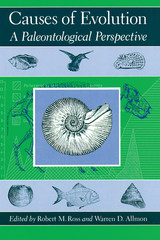
Causes of Evolution
A Paleontological Perspective
Edited by Robert M. Ross and Warren D. Allmon
University of Chicago Press, 1990
By studying evolution across geological time, paleontologists gain a perspective that sometimes complements and sometimes conflicts with views based solely on studies of extant species. The contributors to Causes of Evolution consider whether factors exerting major influences on evolution are biotic or abiotic, intrinsic or extrinsic.
Causes of Evolution presents a broad sampling of paleontological research programs encompassing vertebrates, invertebrates, and vascular plants; empirical work and theoretical models; organisms ranging in age from Cambrian to Recent; and temporal scales from ecological time to hundreds of millions of years. The diverse array of research styles and opinions presented will acquaint scientists in related fields with the strengths and weaknesses of paleontology as an approach to evolutionary studies and will give evolutionary biologists of every stripe new bases for evaluating the scope and bias of their own work.
Causes of Evolution presents a broad sampling of paleontological research programs encompassing vertebrates, invertebrates, and vascular plants; empirical work and theoretical models; organisms ranging in age from Cambrian to Recent; and temporal scales from ecological time to hundreds of millions of years. The diverse array of research styles and opinions presented will acquaint scientists in related fields with the strengths and weaknesses of paleontology as an approach to evolutionary studies and will give evolutionary biologists of every stripe new bases for evaluating the scope and bias of their own work.
[more]
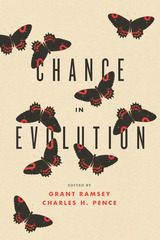
Chance in Evolution
Edited by Grant Ramsey and Charles H. Pence
University of Chicago Press, 2016
Humans, however much we would care to think otherwise, do not represent the fated pinnacle of ape evolution. The diversity of life, from single-celled organisms to multicellular animals and plants, is the result of a long, complex, and highly chancy history. But how profoundly has chance shaped life on earth? And what, precisely, do we mean by chance? Bringing together biologists, philosophers of science, and historians of science, Chance in Evolution is the first book to untangle the far-reaching effects of chance, contingency, and randomness on the evolution of life.
The book begins by placing chance in historical context, starting with the ancients and moving through Darwin and his contemporaries, documenting how the understanding of chance changed as Darwin’s theory of evolution by natural selection developed into the modern synthesis, and how the acceptance of chance in Darwinian theory affected theological resistance to it. Subsequent chapters detail the role of chance in contemporary evolutionary theory—in particular, in connection with the concepts of genetic drift, mutation, and parallel evolution—as well as recent empirical work in the experimental evolution of microbes and in paleobiology. By engaging in collaboration across biology, history, philosophy, and theology, this book offers a comprehensive and synthetic overview both of the history of chance in evolution and of our current best understanding of the impact of chance on life on earth.
The book begins by placing chance in historical context, starting with the ancients and moving through Darwin and his contemporaries, documenting how the understanding of chance changed as Darwin’s theory of evolution by natural selection developed into the modern synthesis, and how the acceptance of chance in Darwinian theory affected theological resistance to it. Subsequent chapters detail the role of chance in contemporary evolutionary theory—in particular, in connection with the concepts of genetic drift, mutation, and parallel evolution—as well as recent empirical work in the experimental evolution of microbes and in paleobiology. By engaging in collaboration across biology, history, philosophy, and theology, this book offers a comprehensive and synthetic overview both of the history of chance in evolution and of our current best understanding of the impact of chance on life on earth.
[more]
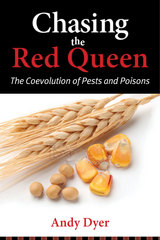
Chasing the Red Queen
The Evolutionary Race Between Agricultural Pests and Poisons
Andy Dyer
Island Press, 2015
In the race to feed the world’s seven billion people, we are at a standstill. Over the past century, we have developed increasingly potent and sophisticated pesticides, yet in 2014, the average percentage of U.S. crops lost to agricultural pests was no less than in 1944. To use a metaphor the field of evolutionary biology borrowed from Alice in Wonderland, farmers must run ever faster to stay in the same place—i.e., produce the same yields.
With Chasing the Red Queen, Andy Dyer offers the first book to apply the Red Queen Hypothesis to agriculture. He illustrates that when selection pressure increases, species evolve in response, creating a never-ending, perpetually-escalating competition between predator (us) and prey (bugs and weeds). The result is farmers are caught in a vicious cycle of chemical dependence, stuck using increasingly dangerous and expensive toxics to beat back progressively resistant pests.
To break the cycle, we must learn the science behind it. Dyer examines one of the world’s most pressing problems as a biological case study. He presents key concepts, from Darwin’s principles of natural selection to genetic variation and adaptive phenotypes. Understanding the fundamentals of ecology and biology is the first step to “playing the Red Queen,” and escaping her unwinnable race. The book’s novel frame will help students, researchers, and policy-makers alike apply that knowledge to the critical task of achieving food security.
With Chasing the Red Queen, Andy Dyer offers the first book to apply the Red Queen Hypothesis to agriculture. He illustrates that when selection pressure increases, species evolve in response, creating a never-ending, perpetually-escalating competition between predator (us) and prey (bugs and weeds). The result is farmers are caught in a vicious cycle of chemical dependence, stuck using increasingly dangerous and expensive toxics to beat back progressively resistant pests.
To break the cycle, we must learn the science behind it. Dyer examines one of the world’s most pressing problems as a biological case study. He presents key concepts, from Darwin’s principles of natural selection to genetic variation and adaptive phenotypes. Understanding the fundamentals of ecology and biology is the first step to “playing the Red Queen,” and escaping her unwinnable race. The book’s novel frame will help students, researchers, and policy-makers alike apply that knowledge to the critical task of achieving food security.
[more]
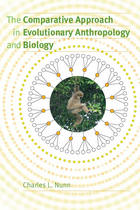
The Comparative Approach in Evolutionary Anthropology and Biology
Charles L. Nunn
University of Chicago Press, 2011
Comparison is fundamental to evolutionary anthropology. When scientists study chimpanzee cognition, for example, they compare chimp performance on cognitive tasks to the performance of human children on the same tasks. And when new fossils are found, such as those of the tiny humans of Flores, scientists compare these remains to other fossils and contemporary humans. Comparison provides a way to draw general inferences about the evolution of traits and therefore has long been the cornerstone of efforts to understand biological and cultural diversity. Individual studies of fossilized remains, living species, or human populations are the essential units of analysis in a comparative study; bringing these elements into a broader comparative framework allows the puzzle pieces to fall into place, creating a means of testing adaptive hypotheses and generating new ones.
With this book, Charles L. Nunn intends to ensure that evolutionary anthropologists and organismal biologists have the tools to realize the potential of comparative research. Nunn provides a wide-ranging investigation of the comparative foundations of evolutionary anthropology in past and present research, including studies of animal behavior, biodiversity, linguistic evolution, allometry, and cross-cultural variation. He also points the way to the future, exploring the new phylogeny-based comparative approaches and offering a how-to manual for scientists who wish to incorporate these new methods into their research.
[more]
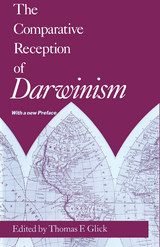
The Comparative Reception of Darwinism
Edited by Thomas F. Glick
University of Chicago Press, 1988
The reaction to Darwin's Origin of Species varied in many countries according to the roles played by national scientific institutions and traditions and the attitudes of religious and political groups. The contributors to this volume, including M. J. S. Hodge, David Hull, and Roberto Moreno, gathered in 1972 at an international conference on the comparative reception of Darwinism. Their essays look at early pro- and anti-Darwinism arguments, and three additional comparative essays and appendices add a larger perspective. For this paperback edition, Thomas F. Glick has added a new preface commenting on recent research.
[more]
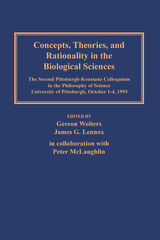
Concepts, Theories, and Rationality in the Biological Sciences
Gereon Wolters, James G. Lennox
University of Pittsburgh Press, 2022
A Unified Report on the “State of the Art” in the Philosophy of Biology
In October 1993, the University of Pittsburgh hosted the Second Pittsburgh-Konstanz Colloquium in the Philosophy of Science, with a focus on the rapidly growing field of philosophy of biology. An interdisciplinary group of philosophers and scientists came together to discuss the basic theories and concepts of biology and their connections with ethics, economics, and psychology. The colloquium organizers strove to create an event that would provide attendees with a wide overview on the current state of the philosophy of biology, with as many topics and views on these topics as possible. Those presentations are gathered here in a volume that offers the reader a varied and thorough survey of the field.
In October 1993, the University of Pittsburgh hosted the Second Pittsburgh-Konstanz Colloquium in the Philosophy of Science, with a focus on the rapidly growing field of philosophy of biology. An interdisciplinary group of philosophers and scientists came together to discuss the basic theories and concepts of biology and their connections with ethics, economics, and psychology. The colloquium organizers strove to create an event that would provide attendees with a wide overview on the current state of the philosophy of biology, with as many topics and views on these topics as possible. Those presentations are gathered here in a volume that offers the reader a varied and thorough survey of the field.
[more]
READERS
Browse our collection.
PUBLISHERS
See BiblioVault's publisher services.
STUDENT SERVICES
Files for college accessibility offices.
UChicago Accessibility Resources
home | accessibility | search | about | contact us
BiblioVault ® 2001 - 2024
The University of Chicago Press



